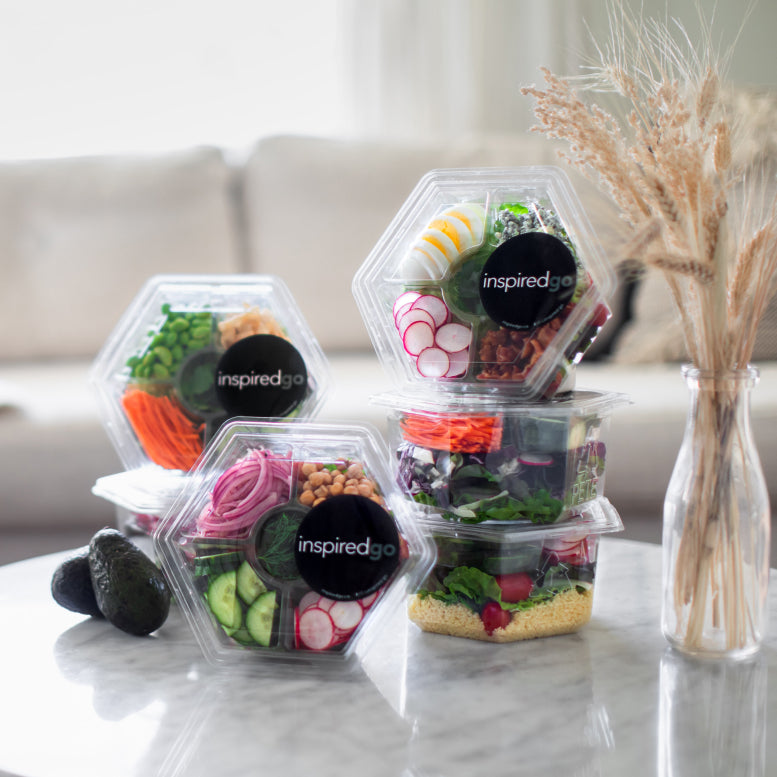What Ingredients Are Used In Vegan Salads?
Table of Contents
1. Unveiling the Ingredients in Inspired Go's Vegan Salads
2. What Are the Nutritional Benefits of Vegan Salads?
3. What Are Vegan Protein Sources for Salads?
4. How Does Inspired Go Make Vegan Eating Convenient?
1. Unveiling the Ingredients in Inspired Go's Vegan Salads
We also incorporate a vibrant selection of vegetables like bell peppers, tomatoes, cucumbers, and radishes. To add a hearty element, we include plant-based proteins like chickpeas, lentils, and tofu. Our salads are further enhanced with delicious toppings like nuts, seeds, and vegan dressings. Choosing our vegan salads not only offers a delicious meal option but also aligns with sustainable eating practices that support local farmers and contribute to reducing food waste.
Order fresh salads today →


2. What Are the Nutritional Benefits of Vegan Salads?
Vegan salads offer a wide range of health benefits, making them a staple for anyone looking to improve or maintain their wellness. Packed with antioxidants from colorful vegetables and leafy greens, they help protect cells from oxidative damage that contributes to aging and disease. Their high fiber content supports digestion, gut health, and healthy cholesterol levels, while plant-based proteins aid in muscle repair and sustained energy production. Healthy fats from avocado, nuts, and seeds promote brain function and heart health, creating a nutrient profile that rivals many traditional meals. Regular consumption of vegan salads can help improve hydration due to their high water content, support weight management naturally, and increase the variety of phytonutrients in your diet. They are a simple yet effective way to deliver concentrated nutrition in every bite, fueling both body and mind.
Choose your salads and schedule delivery →
3. What Are Vegan Protein Sources for Salads?
Protein is an essential part of any balanced meal, and vegan salads offer plenty of plant-based options to meet your daily needs. Ingredients like chickpeas, lentils, quinoa, tofu, tempeh, and edamame are all excellent sources of high-quality protein, delivering the amino acids needed for muscle repair and sustained energy. Seeds and nuts, such as pumpkin seeds, almonds, and sunflower seeds, not only boost protein content but also add crunch and healthy fats to your meal. These proteins help keep you full for longer, making vegan salads a satisfying choice for lunch or dinner. When combined thoughtfully with fresh vegetables and whole grains, these plant-based proteins can provide a complete nutritional profile that supports active lifestyles and overall wellness, making vegan salads a reliable, nutrient-packed option for daily meals.
Get fresh salads and snacks delivered →
4. How Does Inspired Go Make Vegan Eating Convenient?
Transitioning to or maintaining a vegan diet often means more planning, prepping, and cooking than many people have time for. Inspired Go solves that problem with fresh, ready-to-eat vegan salads designed to fit into even the most hectic lifestyles. Each salad is carefully curated by chefs to provide complete nutrition in every bite, with a focus on diverse flavors, textures, and nutrients that keep meals exciting. Our delivery service removes the burden of shopping, chopping, and portioning, giving you more time to focus on your day while still eating well. With a rotating menu full of creative, plant-based options, Inspired Go ensures vegan eating stays effortless, delicious, and sustainable long-term. You get all the benefits of home-prepared, nutrient-dense salads without the time commitment, making healthy choices simpler than ever.
Try our fresh, ready-to-eat salads →
Frequently Asked Questions
The most nutritious salad greens are dark leafy varieties like spinach, kale, and arugula. These greens are packed with essential vitamins, including A, C, and K, as well as minerals like calcium and iron. Kale is particularly rich in antioxidants, while spinach offers significant amounts of folate and magnesium. Choosing a mix of dark greens enhances both the flavor and nutritional value of your salad.
A healthy salad includes a balance of nutrient-dense ingredients like leafy greens, fresh vegetables, lean proteins, and healthy fats. For example, a base of spinach and kale, paired with grilled chicken, cherry tomatoes, avocado, and a light olive oil dressing, creates a wholesome meal. Avoid fried toppings or sugary dressings, as they add empty calories, and opt for natural ingredients to maximize nutrition.
Yes, eating salad daily is a healthy habit when it includes a variety of fresh, nutrient-rich ingredients. Salads offer fiber for digestion, antioxidants for immunity, and essential nutrients like potassium and folate. Regularly eating salads can support weight management and improve energy levels. To avoid monotony, vary your greens, proteins, and toppings to keep meals satisfying and nutritionally balanced.
Healthy salad dressings are typically made with simple, natural ingredients. Olive oil-based dressings, paired with balsamic vinegar or fresh lemon juice, provide healthy fats and enhance flavor without unnecessary calories. Avoid store-bought dressings with high sugar or preservatives. For a creamy alternative, opt for homemade dressings using Greek yogurt or avocado for added nutritional benefits.
Yes, salads are incredibly beneficial for overall health when prepared with fresh, whole ingredients. They are low in calories and high in vitamins, minerals, and antioxidants, supporting heart health, digestion, and immunity. Adding a mix of proteins and healthy fats creates a satisfying, nutrient-dense meal. Regularly incorporating salads into your diet can promote long-term well-being and energy.

